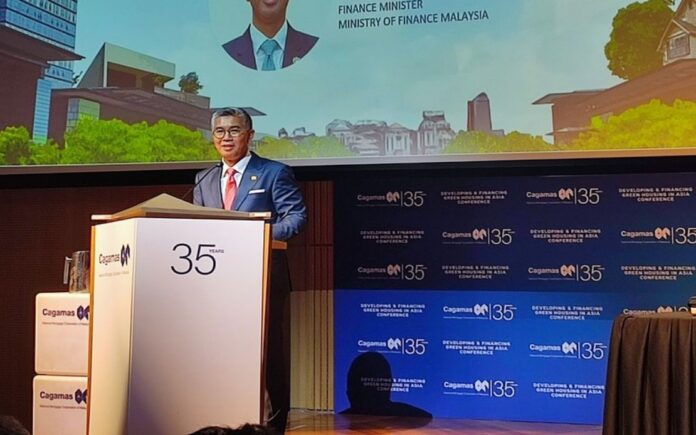KUALA LUMPUR, Sept 21 — The government is working hard to ensure that the transition towards sustainability, whether via tax incentives, private sector initiatives, or financing and investment facilities, will not disenfranchise the poor, or systematically exclude the micro small and medium enterprises (MSMEs).
Finance Minister Tengku Datuk Seri Zafrul Abdul Aziz said a greener economy does not become synonymous with an exclusive club that can only be joined by those with resources to build the right capacity for compliance and periodic reporting of sustainable initiatives.
“If a ‘greener’ house is on the market, is it financially accessible to lower-income buyers? If compliance costs are too high, small and micro businesses may eventually be pushed out of the market.
“A just transition also demands that we seriously consider the potential loss of jobs through the operationalisation of more eco-friendly production or manufacturing techniques,” he said in his keynote speech at Cagamas Bhd’s conference: Developing and Financing Green Housing in Asia: here today.
Tengku Zafrul said the ministry recognises that green finance can be a catalyst to advance green development.
“A case in point is the issuance of the world’s first sovereign US Dollar Sustainability Sukuk by the Malaysian government in April 2021 to the value of US$800 million which was oversubscribed by 6.4 times across the world.
“The proceeds from the issuance were used to finance sustainability-related programmes and projects,” he said.
As announced in Budget 2022, the minister said the government will issue up to RM10 billion of Sustainability Sukuk denominated in ringgit with proceeds similarly channelled to eligible social or environmentally friendly projects.
In terms of operationalising Malaysia’s sustainability objectives, he said various efforts have begun through the ecosystem of the Ministry of Finance (MoF), including the launch of the enhanced Sustainable and Responsible Investment-linked (SRI-linked) Sukuk Framework by the Securities Commission Malaysia (SC) to facilitate companies’ issuance of SRI-linked Sukuk for the transition towards low-carbon activities.
Another effort was shown through the Joint Committee on Climate Change (JC3), which was co-chaired by Bank Negara Malaysia and the SC.
JC3 targets to accelerate the financial sector’s response to climate risks, as well as Bursa Malaysia’s proposed changes to its Listing Requirements aimed at improving sustainability disclosures for listed companies across all sectors following the recommendations of the Task Force on Climate-related Financial Disclosures (TCFD) Application Guide for Malaysian Financial Institutions early this year.
“MoF has also instituted policies and measures to empower SMEs to embrace sustainable and low-carbon practices. This includes measures such as the RM1 billion Low Carbon Transition Facility via Budget 2022.
“Our government-linked investment companies, too, such as Khazanah Nasional, Permodalan Nasional Bhd (PNB), Employees’ Provident Fund (EPF), and Kumpulan Wang Persaraan (KWAP) have begun their respective sustainability journeys, particularly in terms of allocating more funding into sustainable assets and investments,” he said.
Meanwhile, Tengku Zafrul said the financial and investment ecosystem also has a key responsibility to help the government address certain structural issues and generate balanced growth opportunities across all business sizes and segments of society.
Otherwise, he said, the government might end up with unintended consequences that do not serve the sustainability and inclusivity agenda in the long run.
“To that end, I expect Cagamas and all industry players here to also play a key role in this space and become the catalyst to support not only the growth of green housing but also the inclusivity agenda in Malaysia,” he added.



















